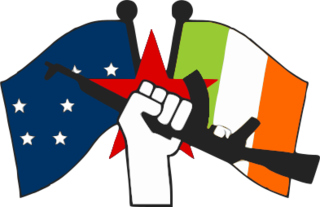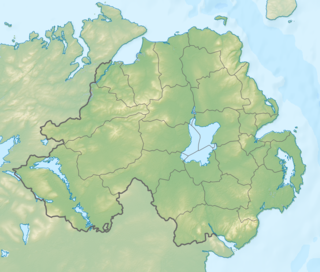
The Continuity Irish Republican Army, styling itself as the Irish Republican Army, is an Irish republican paramilitary group that aims to bring about a united Ireland. It claims to a direct continuation of the original Irish Republican Army and the national army of the Irish Republic that was proclaimed in 1916. It emerged from a split in the Provisional IRA in 1986 but did not become active until the Provisional IRA ceasefire of 1994. It is an illegal organisation in the Republic of Ireland and is designated a terrorist organisation in the United Kingdom, New Zealand and the United States. It has links with the political party Republican Sinn Féin (RSF).

The Irish Republican Army, also known as the Provisional Irish Republican Army, and informally as the Provos, was an Irish republican paramilitary organisation that sought to end British rule in Northern Ireland, facilitate Irish reunification and bring about an independent, socialist republic encompassing all of Ireland. It was the most active republican paramilitary group during the Troubles. It saw itself as the army of the all-island Irish Republic and as the sole legitimate successor to the original IRA from the Irish War of Independence. It was designated a terrorist organisation in the United Kingdom and an illegal organisation in the Republic of Ireland, both of whose authority it rejected.
The Real Irish Republican Army, or Real IRA (RIRA), is a dissident Irish republican paramilitary group that aims to bring about a united Ireland. It formed in 1997 following a split in the Provisional IRA by dissident members, who rejected the IRA's ceasefire that year. Like the Provisional IRA before it, the Real IRA sees itself as the only rightful successor to the original Irish Republican Army and styles itself as simply "the Irish Republican Army" in English or Óglaigh na hÉireann in Irish. It is an illegal organisation in the Republic of Ireland and designated as a proscribed terrorist organisation in the United Kingdom and the United States.
State terrorism refers to acts of terrorism which a state conducts against another state or against its own citizens.

The Troubles was an ethno-nationalist period of conflict in Northern Ireland that lasted about 30 years from the late 1960s to the late 1990s. Also known internationally as the Northern Ireland conflict, it is sometimes described as an "irregular war" or "low-level war". The conflict began in the late 1960s and is usually deemed to have ended with the Good Friday Agreement of 1998. Although the Troubles mostly took place in Northern Ireland, at times the violence spilled over into parts of the Republic of Ireland, England, and mainland Europe.

The Irish National Liberation Army is an Irish republican socialist paramilitary group formed on 10 December 1974, during "the Troubles". It seeks to remove Northern Ireland from the United Kingdom and create a socialist republic encompassing all of Ireland. It is the paramilitary wing of the Irish Republican Socialist Party (IRSP).

Siol nan Gaidheal is a minor Scottish proto-fascist and ethnic nationalist group which describes itself as a "cultural and fraternal organisation".
Red Action was a British leftist political group formed in 1981. It became known for violently confronting groups such as the British National Party on the streets, and for being the main organisational force behind Anti-Fascist Action. In 1995, The Independent estimated that it had between 20 and 30 branches with 10–15 activists in each, and the paper stated that the group "enthusiastically espouses the use of violence"; it also set out links between Red Action and the Irish republican movement, and stated that members operated primarily in large cities such as London, Manchester, Leeds and Glasgow.
Column 88 was a neo-Nazi paramilitary organisation based in the United Kingdom. It was formed in the early 1970s, and disbanded in the early 1980s. The members of Column 88 undertook military training under the supervision of a former Royal Marine Commando, and also held regular gatherings attended by neo-nazis from all over Europe. The name is code: the eighth letter of the alphabet 'HH' represents the Nazi greeting 'Heil Hitler'. Journalist Martin Walker described Column 88 as a "shadow paramilitary Nazi group".
The Irish Socialist Republican Party was a small, but pivotal Irish political party founded in 1896 by James Connolly. Its aim was to establish an Irish workers' republic. The party split in 1904 following months of internal political rows.

The Irish Republican Army (IRA) is a name used by various paramilitary organisations in Ireland throughout the 20th and the 21st centuries. Organisations going by this name have been dedicated to irredentism through Irish republicanism, the belief that all of Ireland should be an independent republic free from British rule. The original Irish Republican Army was raised in 1917 from members of the Irish Volunteers and the Irish Citizen Army, later reinforced by Irishmen who returned to Ireland to fight against Britain in the Irish War of Independence. In Irish law, this IRA was the army of the revolutionary Irish Republic as declared by its parliament, Dáil Éireann, in 1919. In the century that followed, the original IRA was reorganised, changed and split on multiple occasions, to such a degree that many subsequent paramilitary organisations have been known by that title – most notably the Provisional Irish Republican Army which was a key participant during the Troubles. The contemporary IRA organisations each claim the sole right to use that name, as they each insist they are the only legitimate descendants of the original IRA.

From 1969 until 1997, the Provisional Irish Republican Army (IRA) conducted an armed paramilitary campaign primarily in Northern Ireland and England, aimed at ending British rule in Northern Ireland in order to create a united Ireland.
Saor Uladh was a short-lived Irish republican paramilitary organisation in Northern Ireland in the 1950s.
Left-wing terrorism or far-left terrorism, sometimes called Marxist–Leninist terrorism or revolutionary left-wing terrorism, is terrorism committed with the aim of overthrowing capitalist systems and replacing them with Marxist–Leninist or socialist societies. Left-wing terrorism also occurs within already socialist states as activism against the current ruling government. It has taken vivid manifestations across the world and presented diverging dynamics and relationships with national governments and political economies.

The Harrods bombing refers to the car bomb that exploded outside Harrods department store in central London on Saturday 17 December 1983. Members of the Provisional IRA planted the time bomb and sent a warning 37 minutes before it exploded, but the area was not evacuated. The blast killed three police officers and three civilians, injured 90 people, and caused much damage. The IRA Army Council claimed it had not authorised the attack and expressed regret for the civilian casualties. After the bombing, the IRA shifted its emphasis towards attacks on military targets on the mainland.
The Republican Socialist Collective was a fringe Irish republican political group in Northern Ireland formed in 1986.

The Elected Authorities Act 1989 is an Act of the Parliament of the United Kingdom. It brought in a law that required candidates standing for election in Northern Irish local and Northern Ireland Assembly elections to declare they would not, by word or deed, express support for or approval of proscribed organisations or acts of terrorism.

The Thiepval Barracks bombing was a double car bomb attack carried out by the Provisional Irish Republican Army (IRA) on 7 October 1996. The bombs exploded inside Thiepval Barracks, the British Army headquarters in Northern Ireland. One British soldier was killed and 31 people were injured. This bombing was the first major attack on a military base in Northern Ireland since the end of the IRA's ceasefire eight months earlier.
The Baltic Exchange bombing was an attack by the Provisional IRA on the City of London, Britain's financial centre, on 10 April 1992, the day after the General Election which re-elected John Major from the Conservative Party as Prime Minister. The one-ton bomb – concealed in a large white truck and consisting of a fertilizer device wrapped with a detonation cord made from 100 lb of semtex – was the biggest bomb detonated on mainland Britain since World War II. The bombing killed three people, injured 91 others, and severely damaged the Baltic Exchange building and its surroundings.









